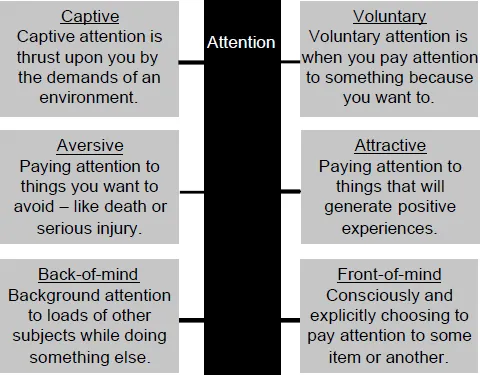
Summary: The Attention Economy
Review and Analysis of Davenport and Beck's Book
BusinessNews Publishing
- English
- ePUB (disponibile sull'app)
- Disponibile su iOS e Android
Summary: The Attention Economy
Review and Analysis of Davenport and Beck's Book
BusinessNews Publishing
Informazioni sul libro
The must-read summary of Thomas Davenport and John Beck's book: `The Attention Economy: Understanding the New Currency of Business`.
This complete summary of the ideas from Thomas Davenport and John Beck's book `The Attention Economy` shows that the scarcest resource for businesses today is not capital, talent or ideas; it is attention. Consumers can only absorb so much information, or choose between so many products. It’s also an issue within the workplace; there are only so many work hours in the day and so many emails one person can reply to. In their book, the authors explain that the successful businesses of the future will realise that time and attention are valuable to their customers, employees and investors. This summary highlights some of the challenges that leaders can expect to face in the coming years and how you can prepare for them.
Added-value of this summary:
• Save time
• Understand key concepts
• Expand your knowledge
To learn more, read `The Attention Economy` and find out why you should focus on allocating attention within your company.
Domande frequenti
Informazioni
Summary of The Attention Economy (Thomas Davenport and John Beck)
1. The Two Central Attention Challenges
- Paying attention to the most important things coming in
- Generating sufficient attention in the things going out
- In deciding how to allocate your own attention in the face of an overwhelming number of options and choices.
- In obtaining and then retaining the attention of your employees, customers and stockholders who are themselves awash in a flood of information resources.



- Before you can manage attention, you first need to gain an understanding of just how depleted this resource is. An attentive human mind if the limiting factor for both sales revenues and internal innovation.
- When people run an ongoing attention deficit, at some stage there will be serious consequences – they will suffer “info-stress” and end up doing nothing.
- Since attention is a scarce resource, markets for attention will emerge. And the laws of supply and demand will mean consumers will come to understand what their attention is worth and demand payment (either in money or in experiences) in exchange for their attention.
- Attention management is not time management. Time management focuses on efficiency and avoiding waste. Attention management focuses on generating insights that enhance effectiveness – getting the right things done.
- Attention always precedes motivated action. Thus, it makes sense to structure meetings in terms of the attention required for each topic rather than the time allocated.
- Incentive systems should be changed not to reward people for the amount of time they spend at the job but for the creative ideas put forward and their success in implementation. That will change your organization from being time-based to becoming attention-based.
- Resources should be applied internally to helping everyone in the organization manage their logistical tasks more effectively – so they can devote less attention to bits and pieces and more attention to innovations and creative work.
- In the industrial era, there was the belief that if you had enough time, you could produce anything. Time was considered a proxy for output. In the current economy, both time and output are becoming less important and the usefulness of ideas is of greater importance. In the future, investors and employers will pay solely on the usefulness of an idea and an organization’s ability to implement that idea effectively.
- Attention management always requires priorities to be established. There will always be more attention available than people can possibly absorb. This information competition will intensify in the future. It’s only when people choose to pay attention to one thing at the expense of all other options that attention exists. Management of attention is our most important commercial activity.